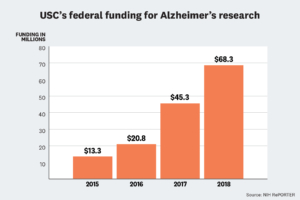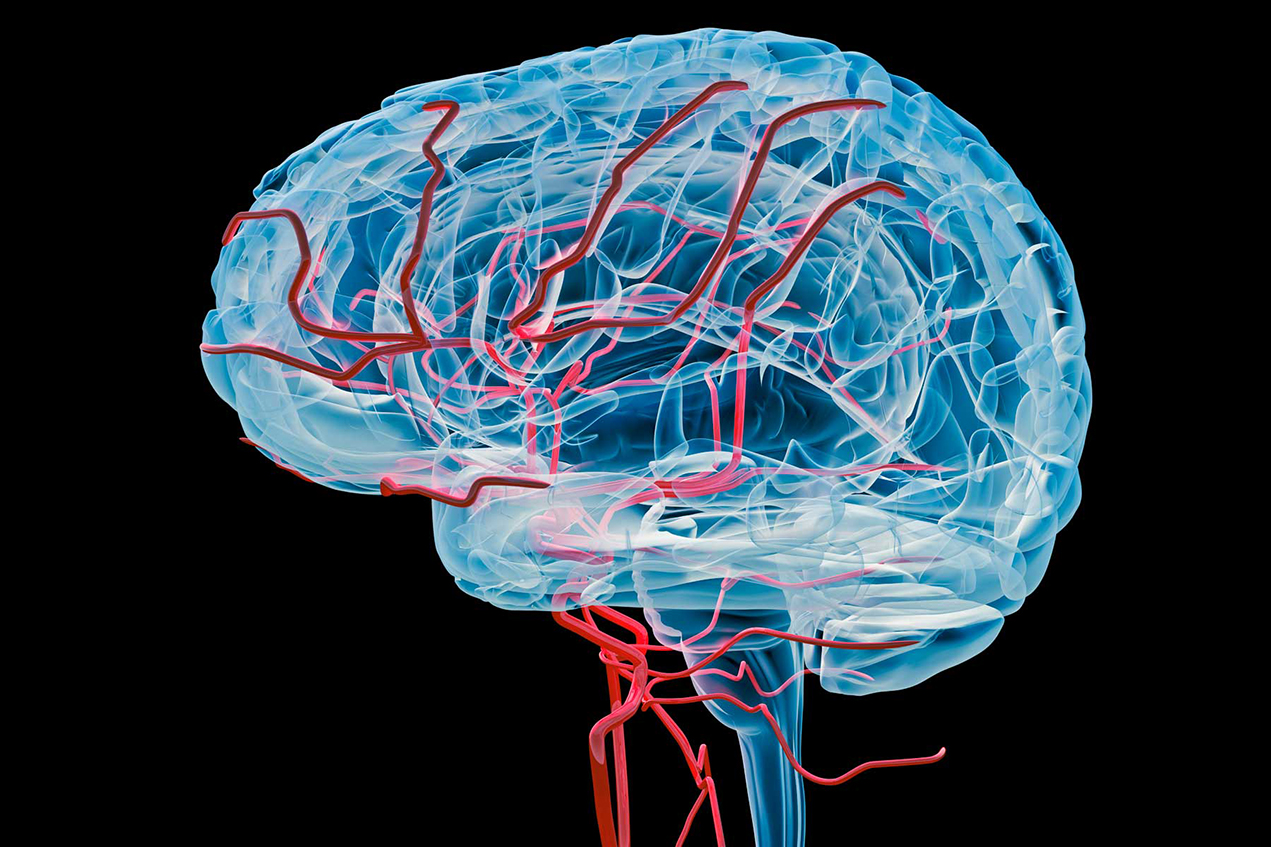Last year, USC received $68 million in funding from the National Institutes of Health — the world’s largest public funder of biomedical research — for research efforts focused on Alzheimer’s disease and related dementias. This is more than five times the $13 million amount granted in 2015.
“USC faculty choose to work on the world’s most important problems,” said USC Provost Charles F. Zukoski, PhD. “Recognizing that more that 5 million Americans suffer from Alzheimer’s disease, a diverse group of our faculty have chosen to seek ways to mitigate the devastating effects of this complex disease,” “The exceptional quality of the ideas and impact of results coming from the Alzheimer’s research labs at USC are reflected in growing NIH support.”
Funding for USC Alzheimer’s research supports trials, drug testing

USC’s federal funding for its research on Alzheimer’s and related dementias increased by more than 400% between 2015 and 2018. That figure includes large grants for clinical trial infrastructure as well as a drug trial to prevent Alzheimer’s in people with “preclinical” disease. (Illustration/Diana Molleda)
Some of the largest awards support the acceleration of clinical trials themselves, as well as testing experimental drugs. For example, the NIH awarded $14 million to Paul Aisen, MD, professor of neurology at the Keck School of Medicine of USC and director of USC’s Alzheimer’s program in San Diego, to coordinate a network of 35 clinical sites that will feed patients into clinical trials. The Alzheimer’s Clinical Trials Consortium is jointly led by Aisen, Reisa Sperling of Brigham and Women’s Hospital in Boston and Ronald Petersen of the Mayo Clinic in Rochester, Minn.
The $14 million is the first installment of what will total $70 million over five years. Other grants cited are part of multi-year awards.
In addition, the NIH awarded Aisen $4.9 million and another $5 million to recruit potential study participants 10 to 20 years before symptoms appear with a free online memory test that participants take from home every three months. This “trial-ready cohort” of people can be invited to take part in a clinical trial, eliminating the lengthy recruitment process that is typical of drug studies.
Also included in 2018 was a $9 million grant to Aisen for a clinical trial of drugs to prevent Alzheimer’s disease in individuals who have evidence of amyloid plaque, a hallmark of Alzheimer’s, but no disease symptoms. They are tracking the rate of subtle cognitive decline in people receiving the anti-amyloid drug versus those receiving placebo.
Research grants to USC faculty members also increased
In 2018, the NIH awarded USC researchers 84 separate grants, up from 32 in 2015. Faculty who received grants of $1 million or more for Alzheimer’s related research last year included:
- Mara Mather, PhD, a professor of gerontology and psychology at the USC Leonard Davis School of Gerontology who studies how emotion and stress affect memory and decisions. Her project involves studying the brain networks responsible for controlling the ability to focus attention and screen out distractions.
- Danny Wang, MD, a professor of neurology at the Keck School and a brain imaging specialist. His project focuses on imaging tiny blood vessels in the brain.
- Yonggang Shi, PhD, an associate professor of neurology at the Keck School who leads the Neuro Image Computing Research group at the Mark and Mary Stevens Neuroimaging and Informatics Institute of USC. His project focuses on neural connections involving the brainstem related to Alzheimer’s disease.
- Vasilis Marmarelis, PhD, the Dean’s Professor of Biomedical Engineering and professor of biomedical engineering at the USC Viterbi School of Engineering. His project focuses on a new class of markers in the brain’s vascular system that could improve prediction of disease progression in Alzheimer’s patients.
- Pinchas Cohen, MD, dean of the USC Leonard Davis School of Gerontology. His project focuses on tiny proteins known as humanin that are found in mitochondria and — through their interaction with the Alzheimer’s gene APOE4 — may protect patients from developing the disease.
- Berislav Zlokovic, MD, PhD, chair and professor of physiology and neuroscience and director of the Zilkha Neurogenetic Institute at the Keck School, and Arthur Toga, Provost Professor of Ophthalmology, Neurology, Psychiatry and the Behavioral Sciences, Radiology and Engineering and director of the USC Mary and Mark Stevens Neuroimaging and Informatics Institute at the Keck School. Their project focuses on vascular contributions to dementia and genetic risk factors for Alzheimer’s disease.
— Leigh Hopper


